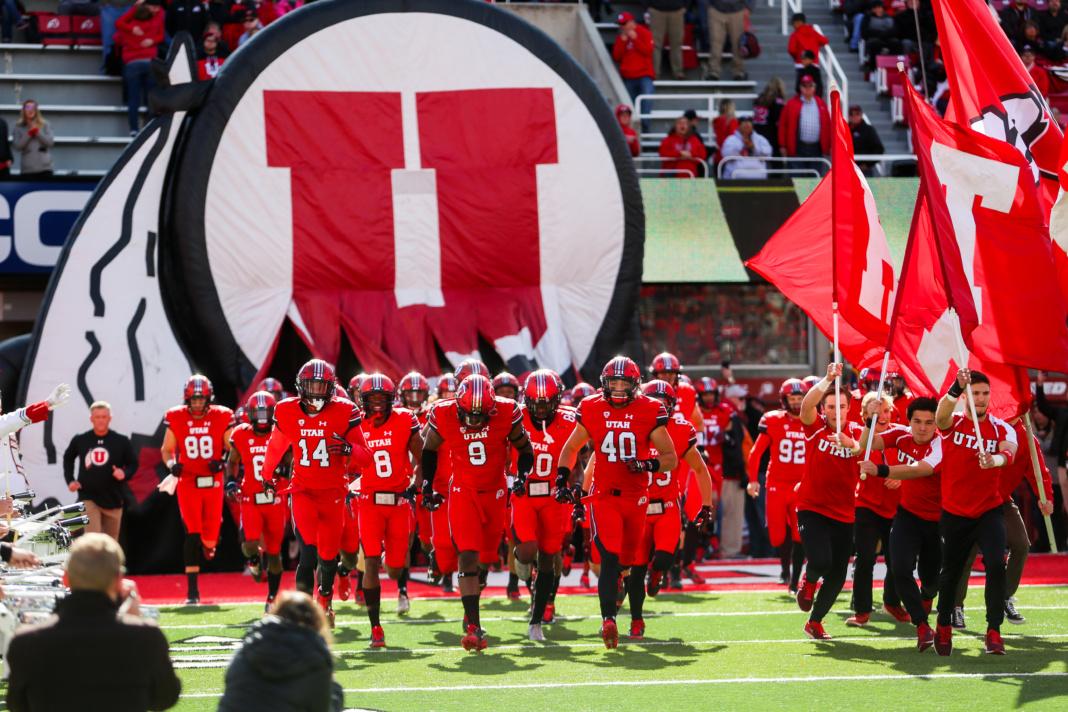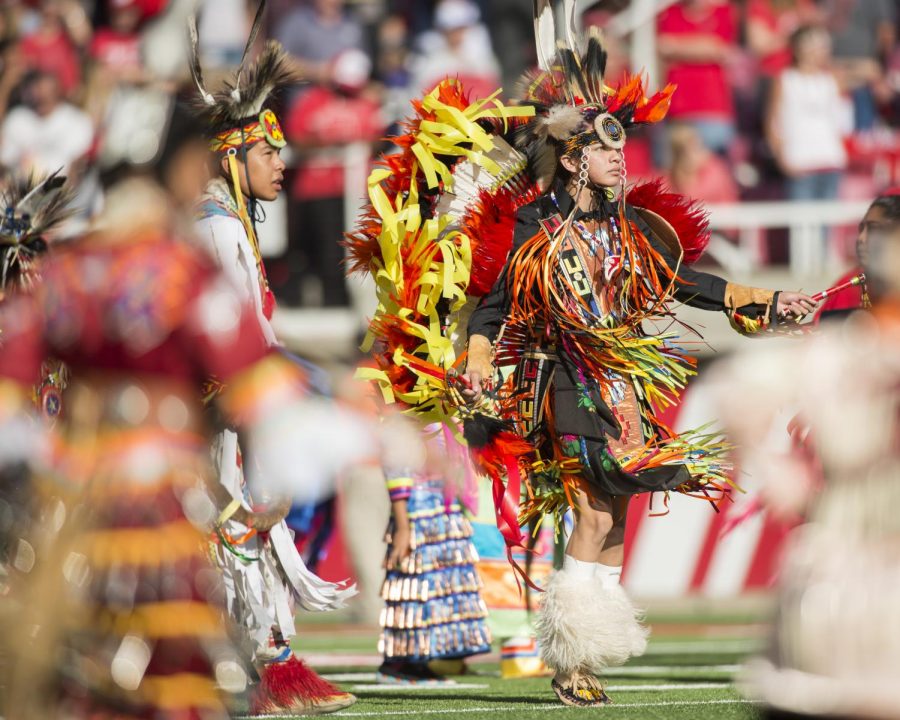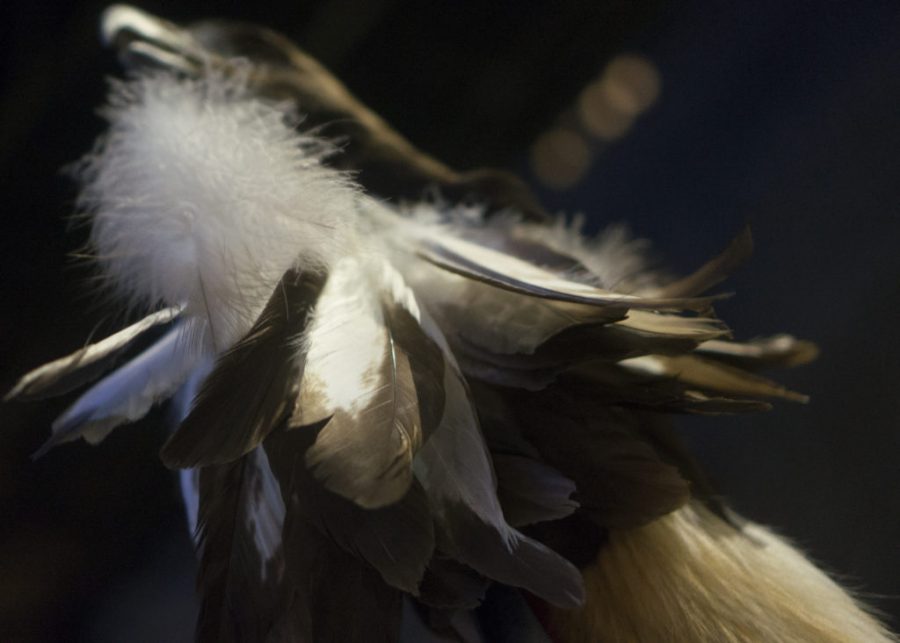Head to Head: Are We the ‘Utah Utes’?
September 17, 2020
Members from the Ute Indian tribe performa a ritual dance during the game vs. the Washington Huskies at Rice-Eccles Stadium on Saturday, October 29, 2016. | Chronicle archives
Poma: What’s in a Name? More than Institutions May Realize
Over the past few months, the powerful resurgence of the Black Lives Matter movement has reignited discussions about racism in the United States – including cultural appropriation. Within these discussions, the problematic names of military bases, schools, professional sports teams and mascots have been under scrutiny. We cannot keep these names because of tradition or history. We need to ensure that any name changes that take place are done correctly and respectfully to avoid further disrespecting members of the communities these names affect.
Beyond our own institution, Utah’s own Dixie State University and Brigham Young University continue to honor people who held racist views in theirschool and building names. As with Confederate statues, many people might argue against changing them because names carry history and cultural memory. But that shouldn’t take priority over the well-being of present communities, whose sense of belonging and even safety is undermined by the centering of racist figures or widespread acceptance of cultural appropriation. That’s exactly why BYU’s Black Student Union has urged the school to rename campus buildings whose namesake openly expressed animosity toward Black people.
On the flip side, though, some people – even those from historically oppressed groups – are not as concerned about these problematic names or symbols. The Bountiful High School Braves, for instance, have had white students dress in fake Native American headdresses and paint their faces for events. While some local Native Americans view the use of such a mascot as highly disrespectful and a form of red-face, other indigenous alumni appreciate the fact that non-Native students want to be a part of and take pride in the culture.
Our own school has been criticized for its continued use of “Utes” to refer to its students, athletes and faculty. People defend its usage, pointing to the March 2020 agreement between the University of Utah and the Ute Tribe to renew the rights to the Ute name as evidence of mutual respect and honorable recognition. Some Utes, such as Luke Duncan, have spoken out about non-tribal members needlessly defending the sovereign nation. Duncan believes that the Ute culture on campus sends a positive message of respect for Native American heritage. This perspective adds a new layer to debate over the U’s continued use of the Ute name.
To its credit, the U has taken steps to educate people about the Ute tribe and respect their wishes as much as possible, such as with the Ute Proud initiative on campus. But the years-long debate of the U’s former Native American mascots, plus other instances of indigenous names or mascots being retired, should also be taken into account when choosing to keep a name or not. The pushback against dairy company Land-O-Lakes’ former use of a Native woman, Mia, in its logo is a great example. The positive reaction from members of Native American communities for their decision to change their logo should set a precedent for companies and organizations to make similar decisions.
Even with these nuances in opinion, names such as “Dixie,” “Braves,” and “Utes” still have historical, often derogatory connotations. It doesn’t matter that some might not see the use of these labels as harmful. If we don’t call out the use of these questionable names on our campuses, we open the door for people to justify the racism of historical figures, or uphold problematic behaviors such as the borderline red-facing at Bountiful High. As Connor Richards wrote for the Chronicle in 2016, many of us would be comfortable if we named an athletic team “the Mormons.” If anyone takes offense to a school’s use of a racially charged or culturally significant name, it doesn’t belong on campus.
Renaming a place, or in the U’s case, its entire community, must come from a desire to stop the justification of racism and disrespectful behavior – not as publicity stunts. For instance, the band Lady A (formerly Lady Antebellum) attempted to sue Anita White, a Black woman and long-time blues singer with the stage name “Lady A,” despite changing their name very recently. This type of behavior is insincere, harmful and counterproductive in terms of achieving racial equity and multicultural harmony.
This issue is complicated, but the U specifically should rescind its usage of the Ute name while continuing to celebrate the culture of the Utes on campus. Changing a name might not seem important, but we should always advocate for what is right rather than what is traditional. As someone who is not a member of the Ute Tribe, I recognize it’s not my place to undermine the tribe’s relationship with the U. However, I still believe the name should be retired. I don’t feel comfortable calling myself a Ute when I don’t have that heritage, but I’m happy that our campus embraces Native culture – and that doesn’t have to go away.

The Native American eagle headdress that was displayed on stage during the Solidarity Rally against racism at Washington Square Park in Salt Lake City, Utah on Monday, Aug. 14, 2017. (Rishi Deka | Daily Utah Chronicle)
Barron: Keep Talking about Re-Nicknaming the U
In late June, the Salt Lake Tribune published an opinion piece by Christopher Mead, a University of Utah employee, arguing that the U needs to retire the Ute nickname as our communities reckon with their white supremacist history. Citing the history of the nickname’s evolution on campus, Mead argued that the continued use of the tribe’s iconography hurts indigenous people more than the memorandum of understanding benefits them. In response, Luke Duncan, the chairman of the Ute Indian Tribe Business Committee, published a piece condemning Mead for raising the issue on behalf of the Ute tribe. As Duncan writes, only the Ute Tribe is empowered to speak on its behalf, however, this fact should not stifle conversations about the continued use of the Ute nickname and its impact on indigenous people.
Last fall break, I was sitting on a plane behind a first-year U student and heard him talking to the stewardess about football. Wondering aloud if her team plays the U, she asked what the U’s mascot was. His prompt reply, “Our mascot is the Ute.” As the university’s athletic teams are always referred to as the Utah Utes, never as the Utah red-tailed hawks, his confusion is understandable. Indeed, an opinion writer for the Daily Utah Chronicle predicted it in 1986, writing, “As long as our athletic teams are called the Utes, the Ute will be considered a mascot.” While Ute is not derogatory, using a tribe’s name as our university’s nickname and de facto mascot is still harmful to native people.
In a report commissioned by the Oneida Indian Nation, researchers found that American Indians experience psychological distress when viewing teams with an American Indian name or mascot. Studies show that the presence of these nicknames and mascots directly results in lower self-esteem within indigenous populations and increased negative associations of American Indians among non-native groups. These effects occur regardless of whether the mascot or team name is considered offensive or a slur. As Dr. Stephanie Fryberg explains, “American Indian mascots are harmful not only because they are often negative, but because they remind American Indians of the limited ways in which others see them. This in turn restricts the number of ways American Indians can see themselves.“
While the U has committed to increasing educational access for indigenous students, continuing to use the Ute nickname undercuts these efforts — indigenous students have indicated that mascots negatively impact their educational experience. When asked about the University of North Dakota’s Fighting Sioux mascot, indigenous students reported that the mascot led them to feel tense in their classes, experience increased stress, avoid university athletic events and worry about their personal safety. Sadly, Native American students are already at an educational disadvantage due to discrimination within the United States educational system. The U is first and foremost an educational institution and no mascot, name or campus traditions are worth jeopardizing students’ educational experiences.
In 2018, Washington State University announced they would penalize anyone utilizing the Ute moniker and banned the use of the drum and feathers logo on their campus. This change was not done to undercut the Ute Tribe’s right to license their name, but instead to ensure no WSU student was uncomfortable attending games or felt misrepresented at university events. While the Ute Tribe can renew their naming agreement with the U, they are not the sole stakeholders in the continued use of the Ute nickname. Other voices, perspectives and research must be part of this conversation as this decision impacts all indigenous people.
I am a white student and I cannot speak to the experience of Utah’s indigenous people nor can I speak on their behalf. Yet research — including studies commissioned by Native American tribes — paints a clear picture that using the Ute name as the university’s nickname is harmful to indigenous people, especially indigenous students. While the Ute Indian Tribe has the absolute right to allow the U to utilize their name, students have a responsibility to ensure our university’s culture does not negatively affect our peers, potential students, and community members. In the past, students have played a key part in the evolution of the U’s mascots and nicknames. Current students can continue this legacy through simple action like choosing to say “Go Utah” instead of “Go Utes,” calling out community members who appropriate American Indian culture and respectfully participating in the debate on the continued use of the Ute name.




